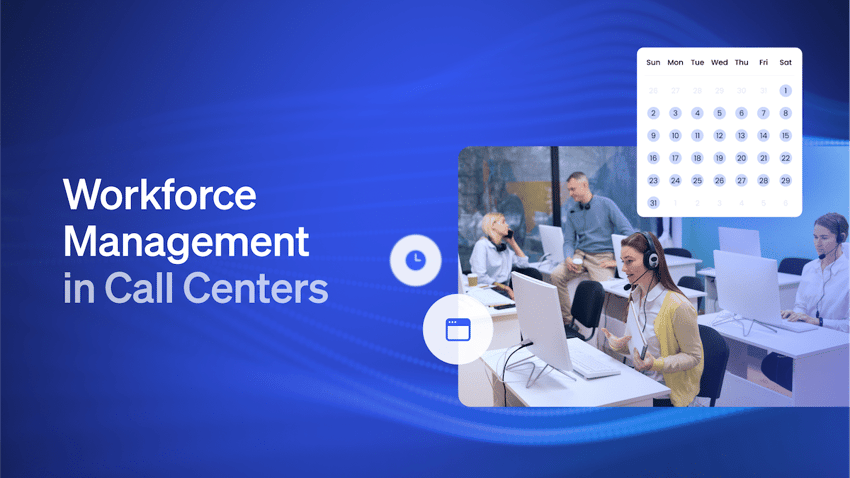Measuring and improving the insurance call center is a strategic choice for many insurers, who are inundated with a high volume of inbound and outbound calls. Whether in-house or via a business process outsourcing (BPO), delivering a consistent, positive, and compliant customer experience is non-negotiable.
Effective call center operations are essential for enhancing efficiency and customer satisfaction. Adopting the right solution can improve efficiency, boost customer satisfaction, and ensure compliance with industry regulations.
Unique Needs of an Insurance Call Center
Call center services play a valuable role in the insurance industry, enabling insurance companies to efficiently manage high volumes of customer inquiries, claims, and policy-related issues.
An insurance contact center is a centralized facility that handles customer interactions via phone, email, chat, or social media, offering personalized service and support to policyholders. Call center agents ensure that customers receive timely and accurate information, which is crucial for maintaining trust and satisfaction.
Insurance call center services can be outsourced to a third-party provider, allowing insurance companies to focus on their core business while ensuring excellent customer service. Outsourcing can lead to significant cost savings, as it eliminates the need for in-house infrastructure and staffing. Additionally, third-party providers often have specialized expertise and cutting-edge technology, which can enhance the overall efficiency and effectiveness of customer interactions.
Effective call center services can lead to increased customer satisfaction, retention, and ultimately, revenue growth for insurance providers. By providing a seamless and responsive customer experience, insurance companies can foster stronger relationships with their clients and differentiate themselves in the competitive insurance industry.
How Insurers Benefit From Call Center Software
Insurance companies can benefit from call center software in several distinct ways, including enhanced customer experience, increased agent efficiency, informed strategic decision-making, and cost reduction.
Benefit #1: Providing a unified customer experience
A unified customer experience creates consistent and powerful brand interactions for customers across multiple channels and touchpoints within the customer lifecycle. This is made possible through several features:
Streamlined customer interactions
Interactive voice response (IVR) systems provide self-service options for basic customer inquiries, such as return policy details or bill payments. By preventing non-complex calls from reaching agents, wait times for all inbound callers can be reduced.
Call routing and automatic call distribution efficiently direct customers to the most qualified agent based on their needs, reducing transfers and improving resolution times. Finally, effortless call transfers between in-office staff, corporate teams, and call center agents can connect customers with someone who can help them quickly.
A byproduct of contact center optimization is that you’ll also uphold compliance and security in every customer interaction. Effective monitoring of call recordings ensures high performance while safeguarding sensitive information.
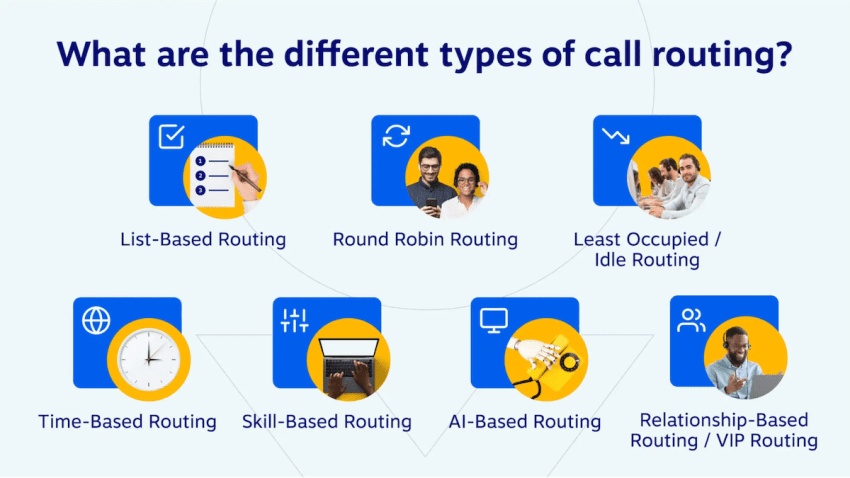
Personalized service
Call center software can integrate with customer relationship management (CRM) systems to provide agents with a complete view of each customer’s policy, claim history, and support records. This enables agents to provide more personalized interactions, resolve customer issues more efficiently, and identify opportunities for upselling or expanding coverage.
Omnichannel support
Using call center software enables a company to handle inquiries across multiple channels, including phone, email, web chat, and SMS messaging, allowing customers to choose their preferred method of contact. Providing numerous support contact methods can increase customer satisfaction and loyalty rates because it’s always best to connect with customers on the platform that’s most convenient for them.
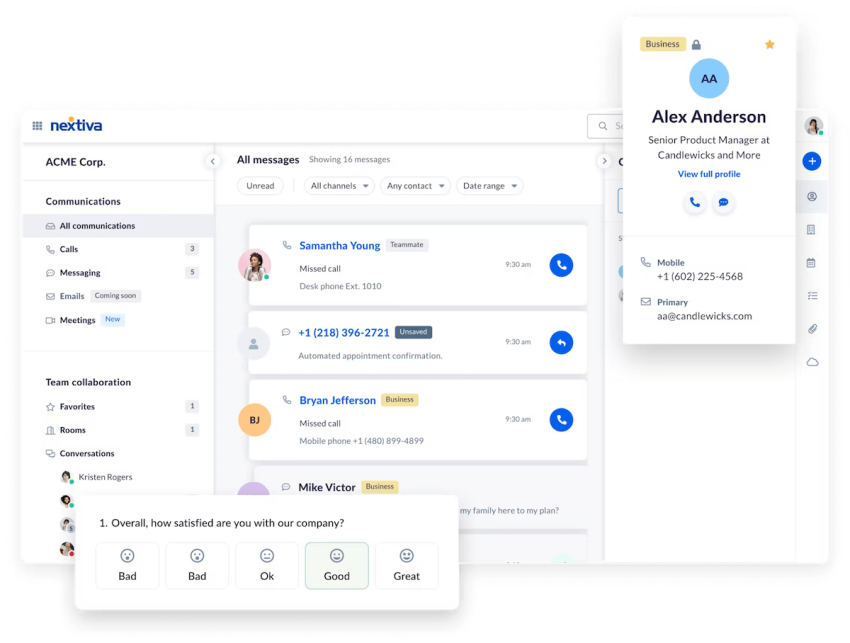
Benefit #2: Improving agent productivity
Enhanced call center agent productivity enables agents to handle more calls, address additional customer concerns, and deliver higher-quality customer support.
Call center software for insurance companies can improve agent productivity in several ways:
Automated workflows
Repetitive tasks, such as data entry or distributing standard policy updates, can be streamlined, freeing up agents to focus on more complex customer interactions.

Call recording
Automatic and on-demand call recording and transcription make it easier for managers to review past interactions for agent performance reviews. These recorded calls can help managers identify training opportunities, which in turn improve agent skills, knowledge, and consistency.
Whether you choose on-demand or automatic call recording, remember to pause recordings when collecting sensitive customer information if required by industry regulations. Maintaining call center performance is crucial, and automated call recordings not only ensure compliance but also enhance the overall efficiency and effectiveness of contact center operations.
See Also: 8 Unexpected Uses for Call Center Recordings
Real-time coaching and monitoring
Supervisors can monitor calls in real-time to offer guidance or intervene if needed. This can ensure quality service delivery.
Agent assist features also remind agents to read verbal disclosures, confirm customer consent, and guide customers through complex insurance processes by following call scripts and templates. While these features are essential for new or in-training agents, all team members can benefit from them.
Performance metrics and reporting
Call center software provides valuable data on agent performance, call volume, and resolution rates. Schedule additional staff for peak hours when call volumes are expected to be high, and utilize data analysis to identify opportunities for targeted improvements.
Call center leadership plays a crucial role in leveraging this data to enhance operational efficiency and customer satisfaction.
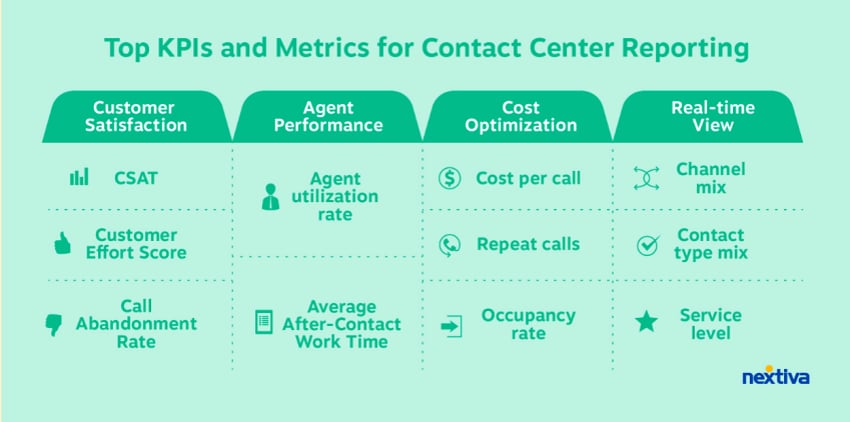
Benefit #3: Data-driven decision-making
Analytics from call center software can help you track customer interactions, identify trends, and reveal opportunities for improvement.
By gaining a deeper understanding of customer behavior and pain points, agencies can tailor their product offerings and service approaches to best serve their target audience. Additionally, addressing customer needs through various communication channels is essential for maintaining loyalty and providing satisfactory solutions and support.
Reduced costs
Cloud-based insurance call center software can reduce costs in several ways, including the following:
- Improved first-call resolution rates minimize the need for follow-up calls, saving time and resources.
- Capturing and displaying all customer information across multiple channels increases productivity.
- Self-service options deflect simple inquiries, reducing agent workloads and associated costs.
- Data-driven insights enable efficient workforce scheduling and targeted marketing campaigns.
Additionally, insurance call center outsourcing offers several essential benefits, including streamlining operations and enhancing customer communication, which ultimately leads to improved customer satisfaction and trust.
Related: Call Center for Insurance Agencies: Must-Have Features
Benefits of Health Insurance Call Centers
Health insurance call centers are specialized facilities that handle customer inquiries, claims, and policy-related issues for health insurance companies.
These call centers require highly trained agents who can provide accurate and empathetic support to policyholders, often dealing with sensitive and complex issues. The nature of health insurance means that customers may be dealing with stressful and urgent situations, making the quality of support they receive even more critical.
Medical call centers must adhere to strict industry regulations, such as the Health Insurance Portability and Accountability Act (HIPAA), to ensure the security and confidentiality of customer information. Compliance with these regulations is non-negotiable, as it protects both the customer and the company from potential legal and financial repercussions.
By outsourcing health insurance call center services, companies can benefit from cost reduction, improved agent performance, and enhanced customer experiences. Outsourcing allows health insurance companies to leverage the expertise of specialized providers who are well-versed in industry regulations and best practices. This can lead to more efficient handling of customer inquiries and claims, ultimately improving customer satisfaction and loyalty.
Protecting sensitive patient data
Data security is a significant concern for every contact center, as they handle sensitive customer information, including personal and financial data. Insurance call centers must implement robust security measures to protect against data breaches and ensure compliance with industry regulations, such as PCI DSS and HIPAA. This includes encrypting customer data, using secure communication channels, and conducting regular security audits.
By prioritizing data security, insurance call centers can maintain customer trust and avoid reputational damage. Customers need to feel confident that their information is safe and that their privacy is respected. Implementing strong security protocols not only protects the company from potential breaches but also enhances the overall customer experience by providing peace of mind.
Insurance call centers should also invest in ongoing training for their agents to ensure they are aware of the latest security practices and regulations. This proactive approach to data security can help prevent incidents before they occur, provided the call center remains compliant with all relevant industry standards.
What Providers Should Look for When Choosing a Call Center Vendor
When selecting a call center provider for insurance companies, certain key features and functionalities should be prioritized.
Inbound & Outbound Voice Features
Look for VoIP service providers that offer features designed to enhance the customer experience.
Some examples include:
- Some examples include:
- Interactive Voice Response (IVR)
- Omnichannel support, including email, SMS messaging, and online chat
- Advanced call management
- Smart call routing, including using auto-attendants and skills-based routing
- CRM system integrations
- Voice, video, email, web chat, and SMS messaging support
In addition to features, you’ll also want to have access to 24/7 technical support for customizing them, as well as to assist with customer inquiries and ensure effective communication regarding insurance products.
Mobile- and desktop-ready deployments
With an increasing number of support agents now working remotely, it’s essential to ensure that your team can assist customers from home and in the field just as effectively as they can from the office.
Call center software should be both desktop- and mobile-friendly, with the option to make outbound calls, receive inbound calls, access customer data, and send photos and updates to the team. Most cloud-based contact center software enables agents to access the system from their desktop or via a mobile app on their phone.
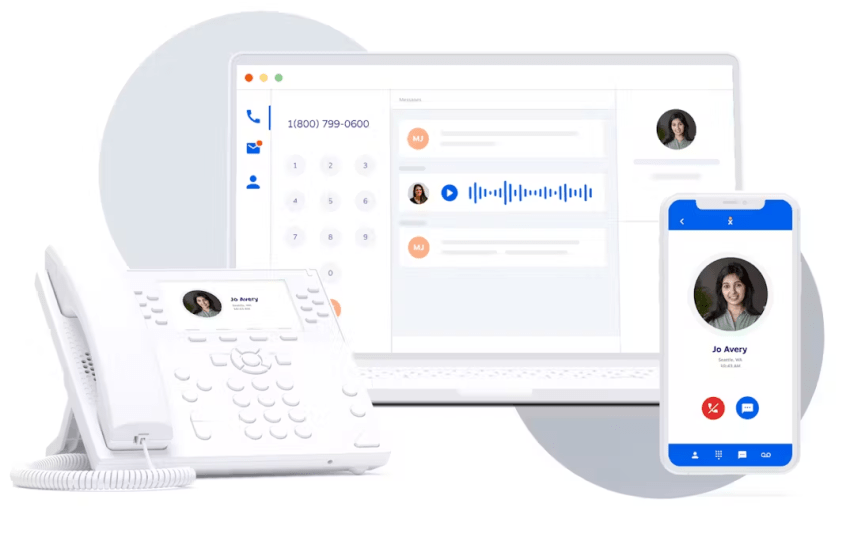
Proven scalability and flexibility
Insurance companies can scale quickly, so be sure to choose a solution that can adapt to your agency’s projected long-term growth. Having the flexibility to scale both up and down in terms of different plans, usage, and features is essential.
To scale effectively, choose a solution that integrates with your existing tech stack, including your CRM.
Reporting and analytics
Look for call center software with robust reporting tools that provide valuable insights into customer and agent performance.
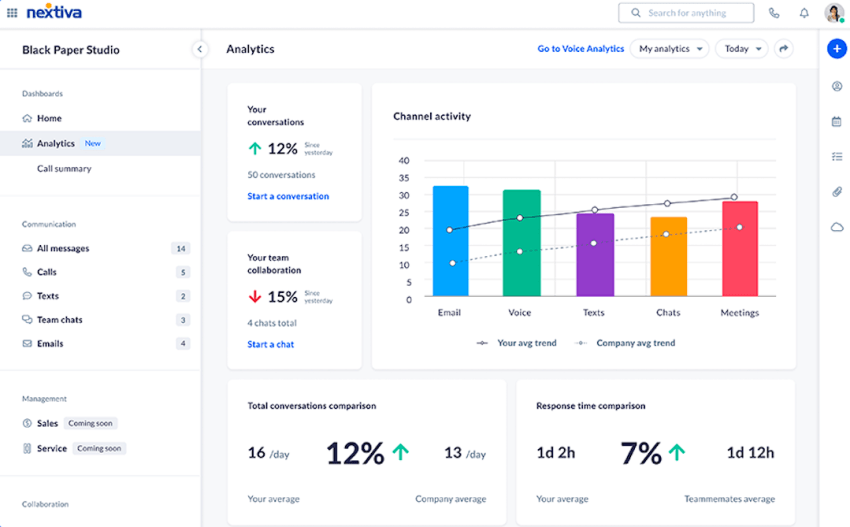
Track call volume, agent performance, and key customer service metrics like customer satisfaction, first call resolution rates, Net Promoter Score, and Customer Effort Score. Monitoring call center performance is crucial for maintaining compliance and security during customer interactions, ensuring high performance while safeguarding sensitive information.
Ease of use to drive adoption
Onboarding, implementation, and adoption should be as easy as possible, so choose a solution with a user-friendly interface. It should be simple for agents to make and receive calls, access customer data, and store customer information.
For call center software, ease of use also includes the need for high call quality and reliable service. For instance, Hancock Insurance came to Nextiva after experiencing poor call quality, unreliable service, and inadequate customer support.
Since working with Nextiva, the company has delivered improved customer service to its customers across the United States and Canada.

“The entire team is happy with Nextiva. We receive great service, and the call quality has improved significantly, plus we can call Canada cheaply! Our potential customers are searching online, and then they call in. With Nextiva, we’re all much more confident in the reliability of our phone service.”
Cory Wormell
Support and training for proper implementation
Select a call center software that offers dedicated customer support, preferably with the option for assistance during onboarding. Reliable agent training resources and vendor support can ensure smooth implementation.
Security and compliance
Security and compliance features for call centers are a critical consideration, but they’re significant for insurance businesses.
Health insurance agencies, for instance, are required to comply with HIPAA. Choosing HIPAA-compliant call center solutions can help ensure your organization is compliant. Nextiva allows agents to pause calls when taking sensitive customer information and disables the automated voicemail-to-email transcript feature.
Security features, including data encryption, two-factor authentication, and access management functionality, are integral to maintaining compliance. Maintaining call center performance while ensuring compliance with automated call recordings contributes to the overall efficiency and effectiveness of contact center operations.
Benefits for Contact Center Agents
Center agents are the frontline representatives of an insurance call center, responsible for handling customer interactions and providing support and solutions to policyholders.
These agents require extensive training on insurance products, policies, and procedures, as well as excellent communication and problem-solving skills. The ability to resolve customer issues efficiently and effectively is crucial, as it directly impacts customer satisfaction and loyalty.
Insurance call center agents must possess the soft skills to handle high-pressure situations with professionalism and empathy. They often deal with complex and sensitive issues, making it essential for them to remain calm and composed. By investing in agent training and development, insurance call centers can enhance customer satisfaction, decrease call volumes, and improve first-call resolution rates.
Training programs should focus on both technical knowledge and soft skills, ensuring that agents are well-equipped to handle a wide range of customer inquiries and interactions. Regular performance evaluations and ongoing education can help agents stay up-to-date with industry changes and continuously improve their skills. This investment in agent development not only enhances the quality of customer interactions but also contributes to a more motivated and capable workforce.
See Also: Hiring Contact Center Agents? Everything You Need to Know
Insurance Providers Trust Nextiva for Call Center Solutions
Choosing the right service provider is essential, which is why so many insurance companies have come to Nextiva.
Nextiva’s insurance solutions offer the following features:
- Advanced call management
- Intelligent routing, including skills-based call routing
- Transparent and affordable pricing
- Reliable service, with 99.999% uptime
- 24/7 customer support, with some plans including dedicated account onboarding
- CRM integrations
- Industry-compliant services, including HIPAA compliance
- Intuitive dashboard and interface
- Advanced call analytics
- Security features, including data encryption that aligns with industry standards
UCPM — a national environmental insurance wholesaler — has a team spread across the country, so securing a strong phone system for internal and external communications was essential. The company chose Nextiva for our high service uptimes, consistent call quality, and exceptional, easy-to-use software. Nextiva’s dedicated training and 24/7 support staff have also kept the team happy.

“Our team didn’t require a lot of training, but those who received it found it simple. They were trained by Nextiva and passed the information along. We got a great deal on our phones and decided to use softphones for our tech team. We were up and running quickly without any issues!”
Bart Jarman
Improve your bottom line.
Nextiva helps insurance agencies increase renewals with one platform for efficient, responsive conversations.
The insurance industry is complex, and it relies heavily on direct agent-to-client interaction. Insurance contact center solutions can enhance the customer experience and engagement while increasing agent productivity, lowering overall costs, and ensuring compliance with industry regulations.
Insurance call center outsourcing can further enhance operational efficiency and customer satisfaction by alleviating pain points and improving communication strategies. Nextiva helps insurance agencies increase renewals with one platform for efficient, responsive conversations.
Customer retention is crucial for maintaining a loyal customer base, as it involves strategies like providing rewards, personalized support, and exceptional service through call centers to transform one-time buyers into repeat customers.


















 Customer Experience
Customer Experience 









